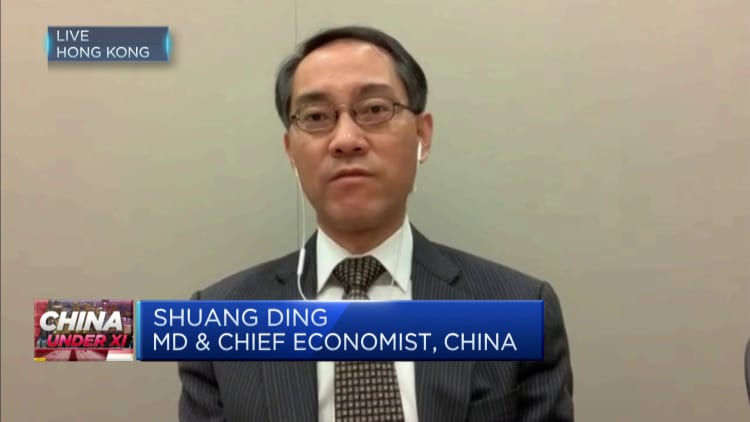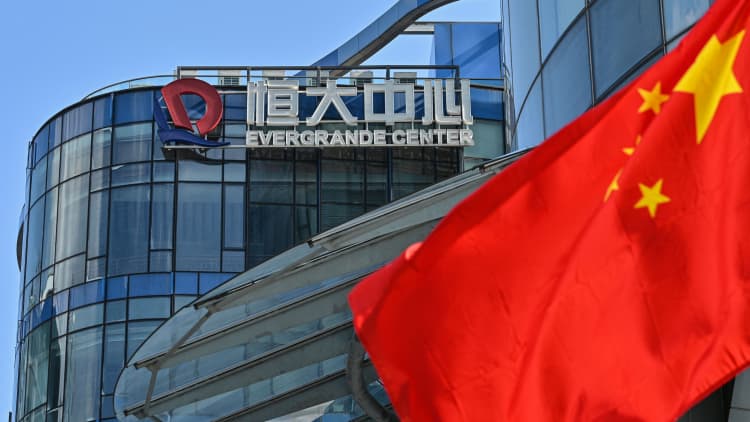Why Beijing won’t bail out its real estate sector
A lot of Chinese developers have halted or delayed building on presold houses due to funds stream challenges. Pictured listed here is a home design site in Jiangsu province, China, on Oct. 17, 2022.
Foreseeable future Publishing | Upcoming Publishing | Getty Pictures
BEIJING — China’s central authorities is not likely to invest billions to help save the having difficulties authentic estate sector, even if foreign investors are hoping for a massive bailout, analysts reported.
A year right after Chinese developer Evergrande‘s credit card debt problems started rattling buyers, the country’s genuine estate difficulties have only gotten worse. Some homebuyers refused to shell out their mortgages thanks to building delays, while assets sales plunged. As soon as-wholesome builders are also struggling to repay financial debt.
“I question there will be immediate bailouts of residence developers by the government, even nevertheless they might proceed to talk to banking institutions and [state-owned enterprises] to support selected troubled builders,” reported Tommy Wu, senior China economist at Commerzbank.
He expects Beijing will want to steadily resolve the difficulties in real estate and lower the industry’s position in the economy. Property and sectors linked to it account for about a quarter of China’s gross domestic merchandise.
“New rounds of measures in the coming months and months will nonetheless most likely proceed to concentrate on supporting home completion and stimulating housing revenue,” Wu claimed.

S&P World Scores stated in September it estimates the property market place wants among 700 billion yuan ($98.59 billion) to 800 billion yuan “to make sure distressed developers can complete presold residences.”
A central govt fund of a comparable dimension has nonetheless to be introduced.
That’s despite numerous experiences, citing resources, of proposed funds. Some financial commitment analysts count on this sort of a fund, primarily a single drastically large sufficient to raise confidence.
Lots of builders are already having difficulties fiscally.
Overall liabilities disclosed by Evergrande, Kaisa and Shimao was a lot more than 2.6 trillion yuan as of mid-2021, soon after which the a few developers’ monetary problems worsened. They make up just a fraction of the marketplace.
At that scale, even if the central govt used hundreds of billions of yuan it would have small outcome, explained Qin Gang, govt director of China real estate exploration institute ICR.
We do not expect bail outs of the troubled builders, though the ‘market-oriented’ technique of supporting significant-top quality developers could continue on…
That is not contemplating that the governing administration is now much more strapped for dollars in comparison to a few a long time ago, he mentioned, pointing to falling revenue from land product sales and taxes, and greater paying on Covid steps.
China’s central federal government gathered about 9.15 trillion yuan ($1.26 trillion) in whole community income in 2021, according to the Ministry of Finance.
That profits for the very first eight months of the year was 6.36 trillion yuan, down by just about 10{d4d1dfc03659490934346f23c59135b993ced5bc8cc26281e129c43fe68630c9} from a year ago with no accounting for tax credits.
Social perception
General public perception is also critical, mentioned Qin who pointed out that people today may get offended if the govt can help those indebted builders.
The issue of delivering completed residences is really sophisticated and demands community coordination to resolve, he added.
In the very last couple months, the central govt slice home loan rates and gave area authorities the obligation of resolving property difficulties. Several towns also comfortable constraints on house purchases this 12 months.
The Ministry of Housing and City-Rural Enhancement emphasised to reporters past month that central authorities measures — special loans to promote house completion — ended up directed at supporting the metropolitan areas in will need of them. No sum was pointed out.
Explosive progress in China’s genuine estate market around the last two decades minted tycoons who were being not fearful of flaunting their prosperity. Beijing has in recent many years emphasised decreasing the nationwide wealth gap.
A great deal of the home sector’s immediate progress was fueled by developers taking on debt. Property rates soared, generating problems of a bubble, when forcing households to choose on financial debt to purchase a household.

A record-very long slump
Based mostly on Barclays’ examination of quarterly assets investment details, the Chinese actual estate decrease has now entered its 10th quarter — a record-very long period of time of a lot more than two a long time, the analysts reported in an Oct. 13 report.
It contrasts with an common four to 5 quarters for prior true estate slumps in China, the report mentioned.
At present the major challenge to restore self esteem is still the weak economy and the drags on purchaser and small business activity thanks to the zero-Covid plan.
Tommy Wu
senior China economist, Commerzbank
A prolonged decline indicates Chinese people today will be much less keen to obtain houses and profit from their climbing charges, the analysts claimed. That implies slipping product sales for builders.
“We do not assume bail outs of the troubled developers, although the ‘market-oriented’ approach of supporting higher-good quality developers could continue on,” the Barclays analysts said, referring to measures like condition-backed certain bond issuance.
Government stance
In an example of how state entities are expected to turn out to be ever more included, Evergrande’s Shenzhen unit introduced in late September it would cooperate with a point out-owned organization to ensure home shipping and delivery.
The central government has normally stored its concentration on issues outdoors of genuine estate.
Many at first expected Beijing’s revival of a central lender lending tool this slide to assistance developers end property development — but it turned out to be for infrastructure, Caixin noted this month, citing sources acquainted with the subject.
The People’s Financial institution of China did not answer to a CNBC request for comment.
“Although far more forceful support will enable [real estate], at the moment the biggest challenge to restore self-confidence is still the weak overall economy and the drags on customer and enterprise exercise owing to the zero-Covid coverage,” Commerzbank’s Wu claimed.
